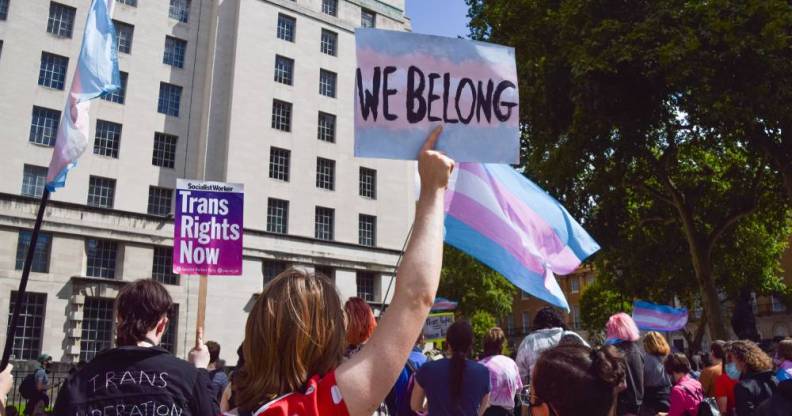Arizona committee passes bill banning trans kids from participating in sports

A protester holds a ‘We Belong’ placard during a trans rights demonstration. (Vuk Valcic/SOPA Images/LightRocket via Getty Images)
An Arizona Senate committee has pushed through a bill that would ban trans youth from competing on sports teams that align with their gender identity.
Senate Bill 1165 (SB 1165) would prevent trans youth from participating in school sports from grade school through to college if the sports involve a publicly-funded institution, AZ Central reported. The proposed law would also apply to private schools should they compete against a public school.
The Senate judiciary committee passed the bill by a 4-3 vote, along party lines, on Thursday (20 January).
SB 1165 would mandate that any “interscholastic or intramural athletic team or sport” sponsored by a public school or a private school “whose students or teams compete against a public school” divide students into “males”, “females” or “coed” teams “based on the biological sex” of the participating students.
Republican senator Warren Petersen, who is also chairman of the committee, argued there was nothing in the bill that would prevent trans you from participating in youth sports completely, but he said trans children won’t be allowed to play on teams for girls and women.
“This bill protects our daughters and our granddaughters,” Peterson said. “It’s absolute lunacy to think that it’s OK to allow a male to dominate in a female sport.”
However, LGBT+ advocates and parents of trans youth argued the proposed legislation would ‘alienate’ young children who just want to participate in school sporting events.
Nicole Cassidy, deputy director of Equality Arizona, told the committee that trans kids should “be able to play with other kids” without fear of such hateful legislation.
“I don’t think that we should be further segregating kids who are already alienated and made to feel like they shouldn’t exist,” Cassidy said.
Vanessa Ansbach, a mother of a young trans daughter, argued the bill “harms” her 10-year-old child and “kids like her”.
“She poses no threat to other girls on her team,” Ansbach said. “She’s one of them, just another teammate, unique in her talents and just out there enjoying the camaraderie and friendship that sports provide.”
Peterson reportedly suggested that a “trans league” be created for trans youth in Arizona.
But Barry Aarons, a lobbyist testifying for the Arizona Interscholastic Association (AIA), explained about a dozen trans students have applied to play on a team aligning with their gender identity in the last decade, the Associated Press reported.
Aarons said seven student-athletes were allowed to play on such teams. He added that the AIA didn’t have a position on the proposed legislation but would follow whatever law went into effect.
Another anti-trans bill, Senate Bill 1130 (SB 1130), was also on the agenda for the committee. But it did not get a hearing, AZ Central reported.
The bill would ban gender-affirming care for trans youth in the state. The ACLU of Arizona said the proposed legislation would also subject healthcare officials to felony penalties and “up to 15 years in prison” for providing gender-affirming care to a trans child or vulnerable adult.
According to the Human Rights Campaign, SB 1130 will be heard in committee on 27 January.
Over 150 Arizona businesses as well as community and faith leaders signed an open letter encouraging lawmakers to focus on issues affecting the state instead of “legislation that targets LGBTQ Arizonans”.
The group especially slammed proposed measures “aimed at excluding transgender youth from full participation in society or restrict fundamental rights”.
“We also implore our lawmakers to not pursue distracting, divisive and discriminatory legislation that will only hurt Arizonans, divide our communities and damage our reputation,” the letter read.
The group argued that such measures will “create harm and add unnecessary hurdles” for the state – “mentally, physically and economically”.

